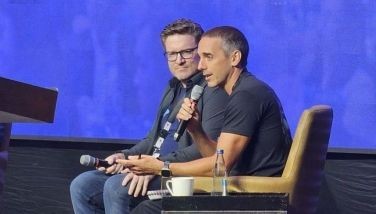Operational execution
January 18, 2002 | 12:00am
Since this is my first article for The Philippine STAR, introductions are appropriate and in order. My background in the communications and technology field is purely hands-on. I’ve had the fortunate experience of having an early start in this field, "boot-camp" style, in the United States Marine Corps – from selecting equipment from nodes to actual satellites to implementing an entire worldwide secure network in 48 hours. My experience with the US military, with it always being many "technology steps" ahead of everybody else, afforded me the opportunity to see the shape of things to come or the base of where we were heading. I have seen the online electronic world grow from a command-line, text-based (almost like SMS), non-commercial world to the GUI (Graphic User Interface) and Flash of today. And that, folks, is what I will be writing about. Past and present scenarios and positive comparisons of my experiences then to what is now happening in the Philippines.
For the most part, my basis for my Did You Know? subject matter will be scenarios from the past and their relevance in today’s Philippine setting. Also, feel free to send me an e-mail if there is any topic which you think we ought to explore. Hopefully, through this exercise, we can jump-start new opportunities or pick up a few lessons learned from misfortunes of other "early adopters."
During my tour in the Marine Corps, I had to build complex global communication networks that were called "reach backs." These networks made possible the transmission of simple yet vital needs – beans (food), bandages (medical), and bullets (tools of the trade). Hence, the network was nicknamed "BBB." You can imagine the urgency in transmitting these needs and the importance of having perfect Operational Execution.
One thing that I have caught on to in my tenure here in the Philippines is there is plenty of headstrong talent. But talent, I think, is only 10 percent of the key to any operational success. Acquiring the discipline to come up with a clear, well-thought out plan for the design/implementation of any project and having flexibility is 90 percent of the operational execution picture. And this takes discipline. Discipline is, indeed, the showstopper in this plane.
Let’s take a simple but very difficult idea that has been attempted by many entrepreneurs – the deployment of public access kiosks. Plainly speaking, public access kiosks are computer terminals that store information – some specific and some general. Public access kiosks can range from the very traditional keyboard and screen-type to the very ornately creative types. Some kiosk deployment pioneers that you may have heard of are Infotouch (Canada) and Centerlinq (US).
The need for public kiosks is even greater in this local setting due to the lack of connectivity. PC penetration is low and is growing at a snail’s pace, land-based phones needed to connect to the Internet are embarrassingly scarce. Many companies with different business models have claimed or are claiming to deploy public access kiosks. But where are these kiosks and are they operational at all?
One example of a Philippine-born and -bred company with a specific map for design, implementation, deployment of public access kiosks is Qnet Communications Inc. (www.qnet.com.ph). Qnet is a network of communication kiosks currently operational in Hong Kong and Metro Manila. Incidentally, Qnet is currently in the running for an international communications award given by a group based in Florida, USA. Their goal is to set up an extensive network of kiosks that are up and running 99.8 percent of the year. In layman’s terms, that translates into a downtime of only 16 hours out of the 8,760 hours in a year. To make this happen, an elaborate and extensive backroom of networks and operations is needed. And this, as of my last walkthrough with the company, they have. More than the fancy backroom operations, Qnet’s main goal is to provide visual communications for overseas Filipino workers (OFWs). Qnet currently has 10 commercial locations and offers communication services, such as video conferencing, video mail, photo mail, etc.
According to Cyril Santiago, Qnet president, the company intends, during the next six months, to find partners and expand its operations in countries where our OFWs are found: Saudi Arabia, Singapore, Japan, etc. Qnet seems to be one of those companies with the right ingredients in the right proportions. It has a proven track record of providing a stable infrastructure of public access kiosks and needed communications services. It is the only public access kiosk project that I know of that has actually deployed units. It has a stable network to ensure the least amount of downtime... It seems to me that this company has all the ingredients for a major take-off soon. Undoubtedly, Qnet is an example of good operational execution.
E-mail your comments to [email protected].
For the most part, my basis for my Did You Know? subject matter will be scenarios from the past and their relevance in today’s Philippine setting. Also, feel free to send me an e-mail if there is any topic which you think we ought to explore. Hopefully, through this exercise, we can jump-start new opportunities or pick up a few lessons learned from misfortunes of other "early adopters."
During my tour in the Marine Corps, I had to build complex global communication networks that were called "reach backs." These networks made possible the transmission of simple yet vital needs – beans (food), bandages (medical), and bullets (tools of the trade). Hence, the network was nicknamed "BBB." You can imagine the urgency in transmitting these needs and the importance of having perfect Operational Execution.
One thing that I have caught on to in my tenure here in the Philippines is there is plenty of headstrong talent. But talent, I think, is only 10 percent of the key to any operational success. Acquiring the discipline to come up with a clear, well-thought out plan for the design/implementation of any project and having flexibility is 90 percent of the operational execution picture. And this takes discipline. Discipline is, indeed, the showstopper in this plane.
Let’s take a simple but very difficult idea that has been attempted by many entrepreneurs – the deployment of public access kiosks. Plainly speaking, public access kiosks are computer terminals that store information – some specific and some general. Public access kiosks can range from the very traditional keyboard and screen-type to the very ornately creative types. Some kiosk deployment pioneers that you may have heard of are Infotouch (Canada) and Centerlinq (US).
The need for public kiosks is even greater in this local setting due to the lack of connectivity. PC penetration is low and is growing at a snail’s pace, land-based phones needed to connect to the Internet are embarrassingly scarce. Many companies with different business models have claimed or are claiming to deploy public access kiosks. But where are these kiosks and are they operational at all?
One example of a Philippine-born and -bred company with a specific map for design, implementation, deployment of public access kiosks is Qnet Communications Inc. (www.qnet.com.ph). Qnet is a network of communication kiosks currently operational in Hong Kong and Metro Manila. Incidentally, Qnet is currently in the running for an international communications award given by a group based in Florida, USA. Their goal is to set up an extensive network of kiosks that are up and running 99.8 percent of the year. In layman’s terms, that translates into a downtime of only 16 hours out of the 8,760 hours in a year. To make this happen, an elaborate and extensive backroom of networks and operations is needed. And this, as of my last walkthrough with the company, they have. More than the fancy backroom operations, Qnet’s main goal is to provide visual communications for overseas Filipino workers (OFWs). Qnet currently has 10 commercial locations and offers communication services, such as video conferencing, video mail, photo mail, etc.
According to Cyril Santiago, Qnet president, the company intends, during the next six months, to find partners and expand its operations in countries where our OFWs are found: Saudi Arabia, Singapore, Japan, etc. Qnet seems to be one of those companies with the right ingredients in the right proportions. It has a proven track record of providing a stable infrastructure of public access kiosks and needed communications services. It is the only public access kiosk project that I know of that has actually deployed units. It has a stable network to ensure the least amount of downtime... It seems to me that this company has all the ingredients for a major take-off soon. Undoubtedly, Qnet is an example of good operational execution.
E-mail your comments to [email protected].
BrandSpace Articles
<
>
- Latest
Latest
Latest
Recommended




























